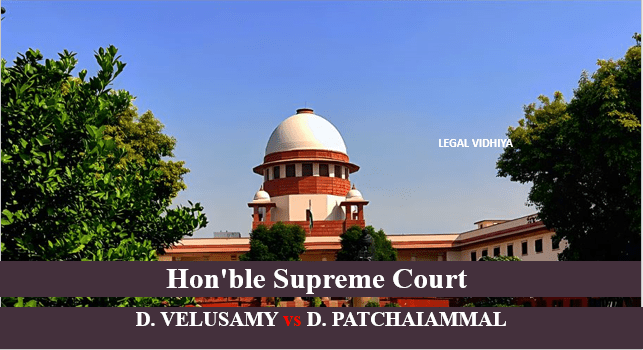
| Citation (2010) 10 SCC 469 |
| Date of Judgement 21 October 2010 |
| Appellant D. Velusamy |
| Respondent D. Patchaiaimmal |
| Court Supreme Court of India |
| Bench Markandey Katju, T.S. Thakur |
| Case Type Criminal Appeal NOS. 2028- 2029 Of 2010 |
FACTS OF THE CASE
- In 2001, the respondent D. Patchaiammal petitioned the Family Court, under Section 125 of Criminal Procedure Code (CrPC), arguing that she married the appellant D.Velusamy on September 14, 1986, and they had lived together for two or three years in her father’s house.
- Following the time, the appellant moved out of the house and began living in his hometown, but he returned on occasions. She claimed she had no source of income and was unable to sustain herself, but the appellant is a Secondary Grade Teacher at Thevanga Higher Secondary School in Coimbatore, earning Rs. 10,000/- per month, and has requested that she be paid Rs. 550 per month as maintenance.
- The appellant asserted that he was married to Lakshmi, whom he wedded on June 25, 1980, according the Hindu Marriage customary rituals. A son was born out of wedlock, and he now attends C.S.I Engineering College in Ooty.
- The appellant provided his ration card, his wife’s voter identification card, his son’s transfer certificate, his wife’s discharge certificate from the hospital, images of the wedding, and other documents to confirm his marriage to Lakshmi.
- The Family Court ruled on March 5, 2004, that the appellant was married to the respondent, not Lakshmi. The Madras High Court upheld the Family Court’s ruling, thus the appellant challenged both the Family Court and the Madras High Court’s verdicts.
ISSUE BEFORE THE COURT
1. Is it true that the appellant first married Lakshmi before marrying the respondent?
2. Is the respondent entitled to maintenance under CrPC Section 125?
RULE OF RATIO DECIDENDI
Section 125 of the CrPC provides for the sustenance of the wife and certain other relatives according to Justice Markandey Katju. The term ‘wife’ is defined in Section 125(1) (b) of the CrPC as follows:
“Wife includes a woman who has been divorced by, or obtained a divorce from, her husband and has not remarried.”
Because Lakshmi was not given notice and was not heard, the lower courts committed a legal error in ruling that she was not married to appellant.
In addition to an order of maintenance under Section 125 of CrPC, Section 20(1) (d) of the Protection of Women from Domestic Violence Act, 2005 provides for maintenance of an aggrieved party. Economic exploitation of the aggrieved is deemed domestic abuse under the Act if the aggrieved and the other party are in a domestic relationship.
A domestic connection, according to Section 2(f) of the Act, includes a marriage-like partnership. To be eligible for the benefits of a “relationship in the nature of marriage”, the parties must meet the conditions for common law marriage and have lived together in a “shared household”, as stipulated in Section 2(s) of the Act.
DECISION OF THE COURT
The Supreme Court ruled that the High Court and the Family Court judge erred in law by ruling that the appellant was not married to Lakshmi without even notifying her, which violated natural justice principles.
As a result, this finding must be reversed, and the case remitted to the Family Court, which can serve notice on Lakshmi and, after hearing her, issue a fresh legal finding.
Only after the above finding can the question of whether the appellant was married to the respondent be resolved, because if the appellant had been married to Lakshmi, the marriage between the appellant and the respondent would not have been legally valid without the dissolution of that marriage.
The Supreme Court further stated that the judgement of the learned family Court judge did not determine whether the appellant and respondent had lived together in a relationship for a reasonable period of time that was in the nature of marriage. In this situation, such a result was important in making a decision.
As a result, the challenged judgements of the High Court and the Family Court Judge, Coimbatore, were reversed, and the case was remanded to the Family Court Judge to be decided again under the law and taking the aforementioned remarks into account. The appeals allowed.
REFRENCES
D.Velusamy vs D.Patchaiammal on 21 October, 2010 (indiankanoon.org)
This Article is written by Manvi Verma of The Law School, University Of Jammu and Intern at Legal Vidhiya.




0 Comments